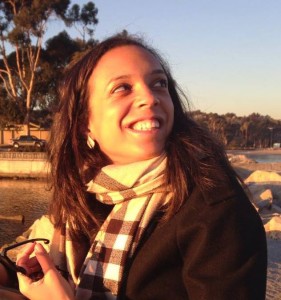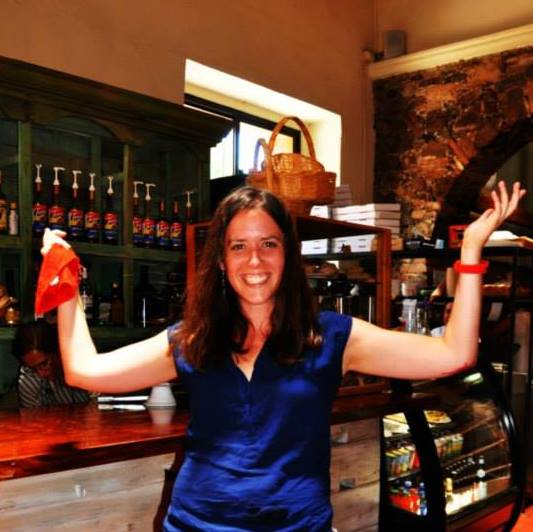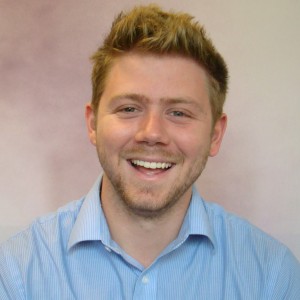One of the many perks of being a CIPA student is that from time to time, alums return to share their expertise with current students. Just a couple weeks ago, we welcomed CIPA graduate Garance Choko ‘12 back to campus. She led a roundtable discussion about her experiences before, after and during her time at CIPA. After the discussion, she agreed to sit down with me for short interview.
Enjoy!

Biography:
Garance is an entrepreneur, international system builder and behavioral innovation strategist currently residing in New York City. Born and raised in Paris, France, she started her career as a concert pianist at the age of 3. Later, when she moved to the United States to continue her performance studies, she fell in love with political theory and design practices. She has designed organizational structures, educational programs, impact evaluations and adaptive strategies for organizations in Europe, the United States, the Caribbean and Latin America. She earned a Master of Public Administration from Cornell University.
Garance’s philosophy is rooted in challenging the notion of institutionalized expertise and its deriving power structures. She has used participatory design principles in her work with the US Congress, the Kennedy Center for the Performing Arts, Clinton Global Initiative, and The Rules and The Lowline. As a speaker and educator, she has taught her unique framework for cross-cultural problem solving at the University of Pennsylvania and Cornell University.
Can you talk a little about your background as a concert pianist and your transition to your current role as an entrepreneur?
I started my career in piano performance at age three. Music has been the medium that has opened many doors for me. I got to meet a lot of people from many different cultures and I was able to travel all over Europe and the Caribbean. Music allows people from many different backgrounds to come together around a shared interest and passion. It is also a combination of extreme discipline, creativity and aesthetics. So I’ve always used music as a tool for communication and reflection. My experience as a musician allowed me to recreate similar atmospheres and spaces in the innovation industry via design thinking.
I’ve always been fascinated by art and diplomacy — How people can transcend political and cultural differences in order to build together. This is why public policy was natural for me. I realized that already established large organizations were too institutionalized to make an authentic difference in the world. So, Design thinking and innovation were a way for me to combine my two passions: creativity and policymaking.
How would you describe design thinking?
It is a problem solving process. It’s been used in architecture and design in general for a while. Design thinking has amazing potential to solve social and economic problems. At the core, it is a way for diverse stake holders to come together at a table, come to a shared understanding, and problem solve together. It mitigates the following questions: How are you able to derive information from very different people? How do you ensure they are able to understand each other? And what is the best way to co-build solutions to very complex problems? The key is having good facilitators in order to ensure that all participants are comfortable and engaged equally. Design thinking is an equalizer that goes beyond traditional brainstorming. It is a way of quickly designing solutions and prototyping. The process demands that you test your ideas right away. For example, if you decide to create a new curriculum, its first iteration will be created on the spot and tested right away through user-testing in order to get feedback and then iterate once more.
Can you further describe your current position right now?
I have three main activities: First, I am an entrepreneur building a new venture, Innovators Without Borders, which encompasses global communities of innovators in the global south. Next, I am a thought leader in the field of participatory design, innovation and systems building. I share my knowledge and ideas by speaking at conferences, doing a lot of writing and leading workshops. Lastly, I am a practitioner and partner with many different organizations who are devoted to using participatory design as a mean to achieve social and economic impact. I am currently collaborating with the Rapid Results Institute on a project in Brownsville, Brooklyn. The goal of this project is to create and/or find employment avenues for 5,000 Brownsville residents. It’s really exciting to partner with organizations that believe in, and will benefit from, community centered design and design thinking.
Prior to this, I used to have a leadership role in an NYC innovation firm, but my passion truly lies in using social innovation and design thinking for social and economic ends, so I decided to embrace my new goals and embark on this adventure.
Can you describe human centered design and participation design/design thinking a bit further?
Human centered design is a component of design thinking. As designers, we create products aiming to respond to human needs. So we need the end users to be involved at each step of the design process since they are the ones who are the best positioned to express and define what they need.
What piqued your interest in these issues and in your new and innovative methods of solving them?
As a woman of color, and as an individual who has navigated many different socio-economic spaces, I’ve witnessed the failure of public policies and programs. So I have always been curious to understand the root cause of these failures, and the potential solutions to avoid such inefficiency and inadequacy. After understanding the policymaking process, I committed myself to never perpetuate the inefficient status quo, but rather, to find alternatives. I have drawn from my personal experiences, as well as my graduate studies at CIPA to understand the system and now, I am well-equipped to challenge it.
This is why I wanted to come to CIPA. If you are passionate about leadership and social change, you need to come up with new methods, rather than blindly reproducing what is. When I was at CIPA, I was active in many student-led organizations. This was a way for me to experience leadership and social change within a more or less safe environment, and I encourage current CIPA students to do the same.
What advice would you give to a current CIPA student interested in working in nonprofit consulting?
The most important thing for a CIPA student now is to avoid staying confined within the technical aspect of public policy. Public systems modeling and statistics can only take you so far, and if you don’t understand the greater context in terms of systemic issues and their roots, you will limit yourself and your impact. Established institutions are not looking for more bureaucrats, they are looking for problem solvers. So CIPA students should take advantage of Cornell’s other schools and take theory classes, or classes in fields in which they have little prior knowledge. The goal is to broaden your horizon and really fulfill your intellectual curiosity. I also recommend gaining firsthand experience through internships and leadership activities. It is also very important to get out of Ithaca and go to N.Y.C. Don’t follow everyone and go to D.C. It is too expected, everyone goes there, it is saturated and it’s not an innovative space. You should go to San Francisco, go to Atlanta, Austin, and Baltimore, go where policy students do not usually go so that you can understand how you are relevant; so you can really apply and refine your craft in order to master it and build your own voice. If you can, travel internationally. Change is being sought in more decentralized places. Do NOT limit yourself to going to D.C.
Also, look at different fields. A career in Public policy should not be limited to becoming a bureaucrat; it is about thinking the world. Look at startups, social innovation and activism. Don’t limit yourself to the government and the public sector. It is so competitive to get even a minor position. You need to find a space in which you can apply your skills to straight away.
What advice would you give to someone interested in pursuing entrepreneurship?
My first advice is that you have a genuine belief and confidence in the idea you are trying to develop. This is the most important thing. If you don’t believe in yourself and what you are trying to do, it will not work out. Also, be sure about your concept and what you are trying to solve for, but be flexible about the process and know that your idea is going to evolve over time.
Also, let’s be honest, if you don’t have a good financial runway, you are not going to survive – which is why few women and minorities are represented in the entrepreneurial space. You need to have access to resources. Otherwise, you can develop your startup on the side while continuing your full time job. Finally, once you have the resources, it is easier to do than what people may think. Partner with people who have the skill set that you do not have. For me, I have no tech background, so I am partnering with those who do. Know what you don’t know and recruit adequately. As an entrepreneur, you must develop your voice and your thinking.





